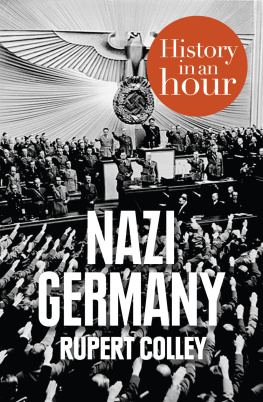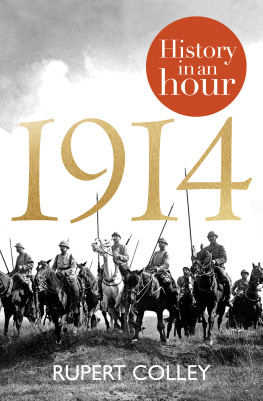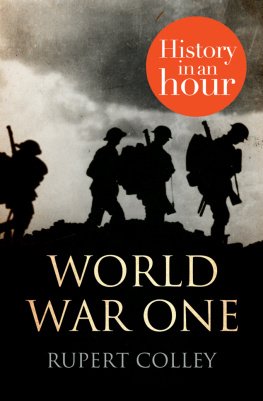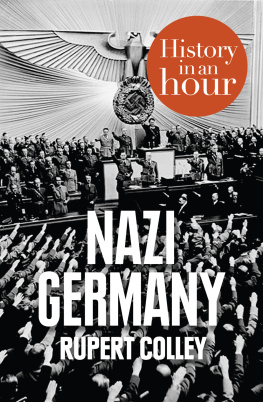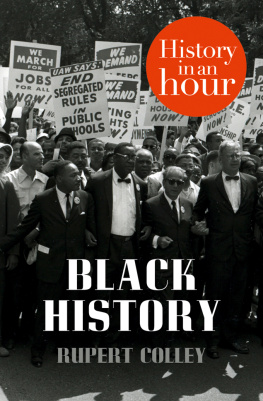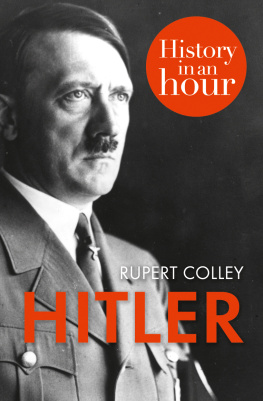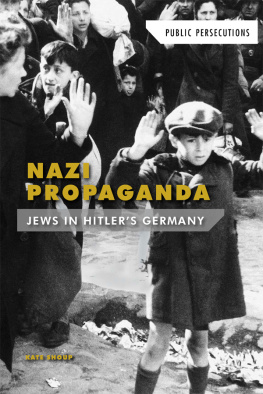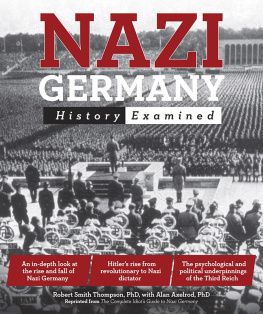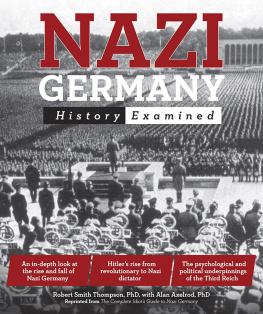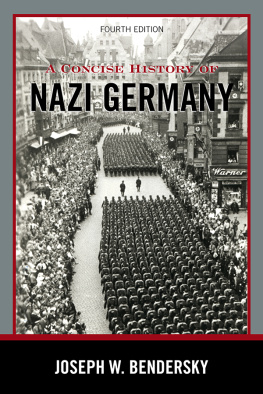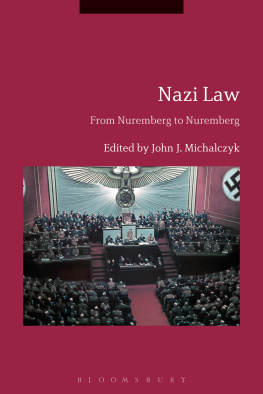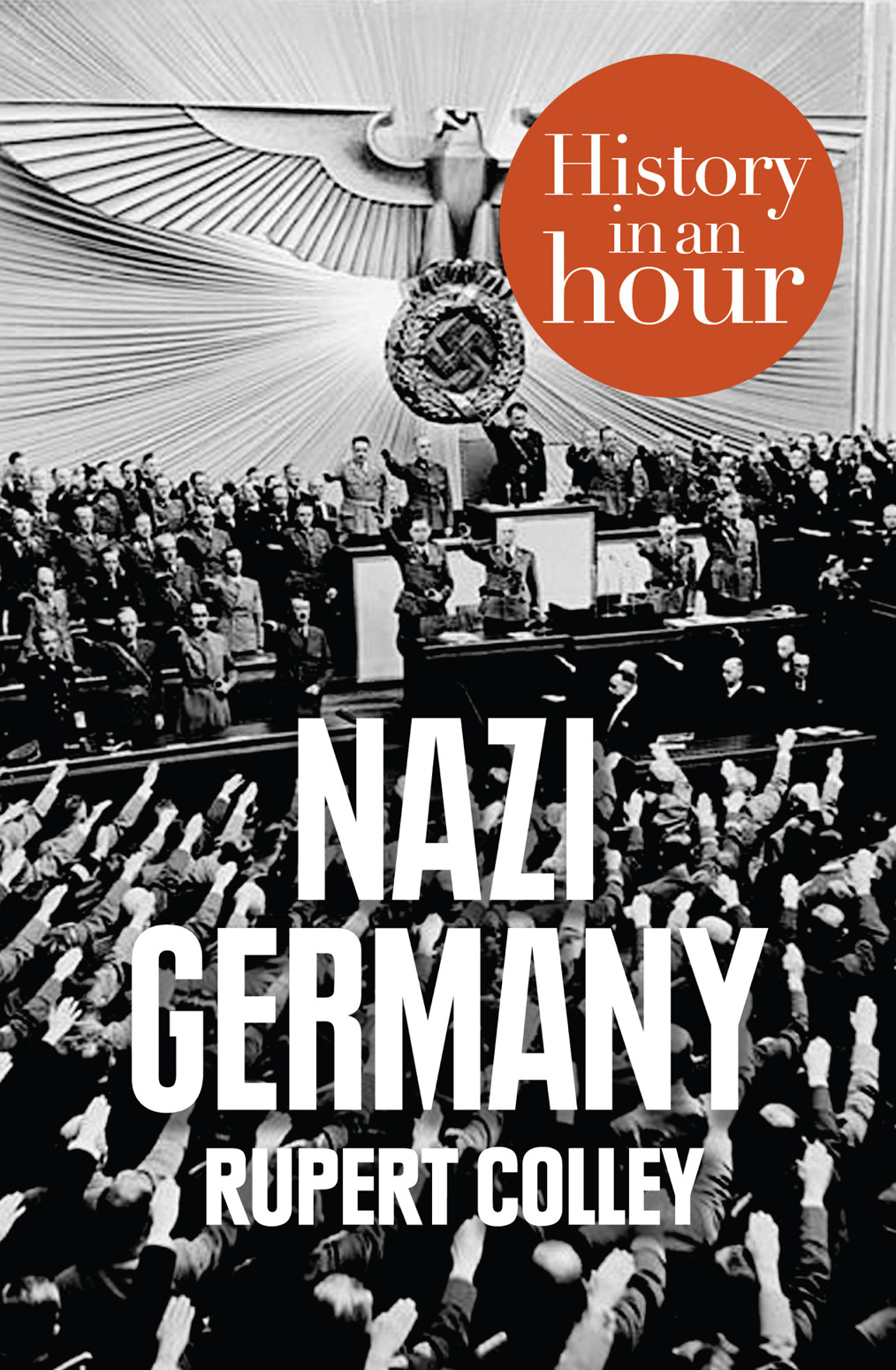
NAZI GERMANY
History in an Hour
Rupert Colley

Contents
History in an Hour is a series of ebooks to help the reader learn the basic facts of a given subject area. Everything you need to know is presented in a straightforward narrative and in chronological order. No embedded links to divert your attention, nor a daunting book of 600 pages with a 35-page introduction. Just straight in, to the point, sixty minutes, done. Then, having absorbed the basics, you may feel inspired to explore further.
Give yourself sixty minutes and see what you can learn...
To find out more visit http://historyinanhour.com or follow us on twitter: http://twitter.com/historyinanhour
And so it had all come to this. Did all this happen only so that a gang of wretched criminals could lay hands on the Fatherland? Hatred grew in me, hatred for those responsible for this deed. The words are those of Adolf Hitler; the deed Germanys surrender in the First World War; and the wretched criminals the politicians who had meekly accepted the surrender and the defeat of Germany.
Germany had suffered during the war not only on the battlefield but also at home. Starvation and fuel shortages, further aggravated by the Spanish flu epidemic of 1918 that killed millions throughout Europe, had led to widespread discontent. Inflation and economic stagnation caused embitterment, and the increasing number of casualties as Germany had to fight a war on two fronts, had left the nation disillusioned.
In October 1918, sailors at the port of Kiel disobeyed orders to fight the British fleet. It was, as they saw it, a pointless and suicidal mission. The revolt soon spread throughout Germany. The province of Bavaria went so far as to establish a socialist republic along Soviet lines. The Kaiser, William II, the unhinged grandson of Queen Victoria, abdicated on 9 November 1918, two days before the armistice, and the chancellor, Prince Max of Baden, appointed a left-wing coalition government and handed over the chancellorship to Friedrich Ebert.
With the abdication of the Kaiser and the collapse of Imperial Germany (the Second Reich or empire), Ebert proclaimed Germany a republic, formed a provisional government (a temporary arrangement until elections could be held) and, on 11 November 1918, signed the armistice that brought the Great War to an end.
But the social unrest continued. In January 1919 the German Communist Party, the Spartacists, staged an uprising in Berlin. Rosa Luxemburg, leader of the movement, had opposed the uprising, arguing that the time was not yet right for communism. But she was unable to contain the fury of the left and Chancellor Ebert turned to the right-wing Freikorps, or Free Corps, for assistance. After three days of intense street fighting the Freikorps, a band of demobilized, nationalistic soldiers, had, with intense violence, crushed the rebellion. Luxemburg was arrested and killed while in police custody.
The Weimar Republic: A Republic Is Born
The first German democratic election took place the same month, January 1919, attracting an 83 per cent turnout and resulting in the formation of a National Constituent Assembly. The situation in Berlin was still volatile so on 6 February the Assembly met for the first time in the town of Weimar and there drew up a new constitution. Six months later the constitution was ratified and the Weimar Republic was born. However, disturbances continued, especially in Berlin and Bavaria, and Ebert again had to call in the Freikorps to keep order. In March 1919 the Freikorps went to work and the Socialist Republic in Bavaria was brought to a bloody end.
On 28 June 1919, Germany reluctantly signed the Paris Peace Settlement in the Hall of Mirrors at the Palace of Versailles exactly five years on from the assassination of Archduke Franz Ferdinand, the spark that had ignited the First World War. Germany had not been permitted to take part in the talks and was too weak, politically and militarily, to resist the dictated terms set by the representatives of thirty-two nations, led by the Allied powers the US, Britain, France and Italy.
The terms were harsh and not for negotiation. Germany lost 13 per cent of her territory, which meant 12 per cent of Germans now lived in a foreign country, and Germanys colonial possessions were redistributed among the other colonial powers. The German Rhineland, on the border with France, was to be demilitarized (stripped of an armed presence) and placed under Allied control until 1935. The small but industrially important Saar region was to be governed by Britain and France for fifteen years, and its coal exported to France in recompense for the French coal mines destroyed by Germany during the war. After fifteen years a plebiscite (or referendum) of the Saar population would decide its future.
Most of West Prussia was given to Poland. The German city of Danzig (modern-day Gdansk) was made a free city so that Poland could have use of a port not situated in Germany. To give Poland access to Danzig, they were given a strip of land, the Polish Corridor, through Prussia, thereby cutting East Prussia off from the rest of Germany.
Militarily, Germanys army was to be limited to a token 100,000 men, and its navy to 15,000, plus a ban on conscription. She was not permitted to have an air force, nor tanks, and was prohibited from producing or importing weaponry.
The payment of reparations was for compensation for all damage done to the civilian population of the Allied powers and their property. It was to include raw material, such as the coal from the Saar and Ruhr regions. Two years later, in 1921, the cost of reparations was announced 6.6 billion, which German economists calculated would take until 1988 to pay. The figure shocked and angered Germans who conveniently forgot that Germany had demanded an even greater sum from a defeated France following the Franco-Prussian War of 187071.
But it was the humiliating clause that forced Germany into accepting responsibility for the war and for the damage to the civilian populations of the Allies that rankled most with the public at home.
The treaty satisfied no one. Germany was outraged. Britain thought it too harsh, believing an economically weak Germany would be detrimental to all Europe; the US, also considering it harsh, refused to ratify the treaty or to join the newly formed League of Nations; and the French felt it not harsh enough. It was they, the French argued, who had suffered most during the war. The French public were so dissatisfied with their president, Clemenceau, that they voted him out six months later, replacing him with Ferdinand Foch who, with sharp intuition, said, This is not peace, this is an armistice for twenty years.
The Weimar government, although democratically elected, was deemed responsible for Germanys humiliation, and criticized by all sides for its weakness in standing up to the Allies. In March 1920 the Freikorps, led by Wolfgang Kapp, tried to seize power in Berlin but the coup, unable to gain the armys support, failed.
The Kapp Putsch, as it became known, may have failed but it illustrated the feeling of anger among the extreme right in Germany. Among the many small political parties was the German Workers Party or, to use its German abbreviation, DAP, set up in 1919 by 35-year-old Munich locksmith, Anton Drexler. The DAP, a far-right party that aimed at appealing to the workers, consisted of only about fifty members but, to give the impression of greater numbers, began their membership cards at number five hundred.
Next page
